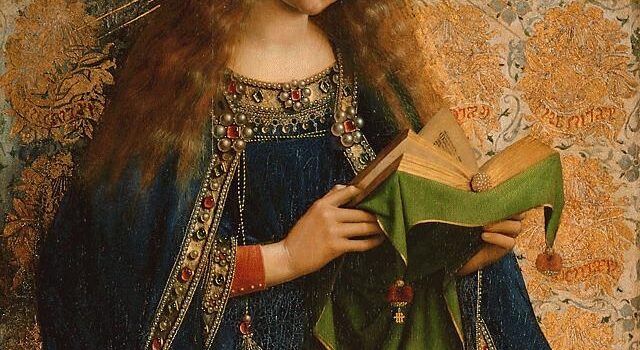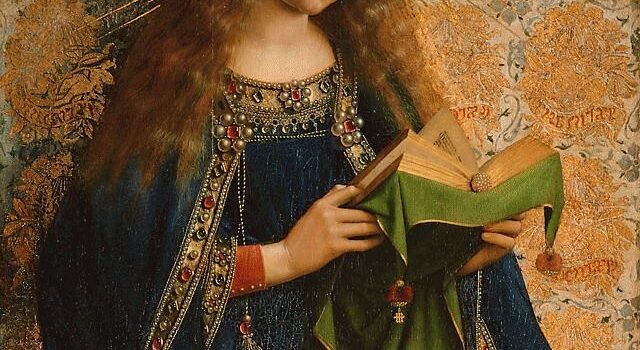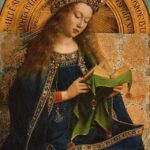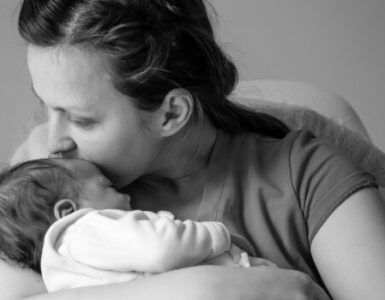When I think of Mary’s coronation, of taking her seat beside Jesus, my mind is always transported to the Apostle John’s vision of heaven. John saw God upon His glorious throne, surrounded by the four living creatures who day and night sing, “Holy, holy, holy, is the Lord God Almighty!” Around God’s throne were twenty-four elders, clad in priestly garments and golden crowns, each seated upon his own throne. Whenever the living creatures gave glory to the Lord, “the twenty-four elders fall down before him who is seated on the throne and worship him who lives for ever and ever; they cast their crowns before the throne, singing” (Rev 4: 8-10). The twenty-four elders in this vision represent the redeemed of the Old and New Covenants (the twelve patriarchs and twelve apostles). They acknowledge that all they have and are flows from God, and joyfully return themselves to Him. We should rest assured that when the court of heaven throws their crowns at the Lord’s feet, Mary’s is always the first to land —and not with a clatter, but a deafening thud.
Mary exemplified such humility during her visitation to Elizabeth. When Elizabeth exclaimed, “Blessed are you among women, and blessed is the fruit of your womb! Blessed is she who believed” (Lk 1:42, 45), Mary’s “reflex” was to glorify God: “My soul magnifies the Lord, and my spirit rejoices in God my Savior, for he has regarded the low estate of his handmaiden. For behold, henceforth all generations will call me blessed; for he who is mighty has done great things for me” (Lk 1:46-49). That is why St. Louis de Montfort called Mary “an echo of God, speaking and repeating only God. If you say ‘Mary’ she says ‘God.’” She seeks no glory for herself; her greatest desire is to direct our eyes to her Son (Jn 2:5). She knows that all she is and all that she accomplished in her earthly life was due to the grace of God, and the same is true of us.
Our lives in God begin in grace. St. Paul writes, “For by grace you have been saved through faith; and this is not your own doing, it is the gift of God” (Eph 2:8). Our growth is also totally dependent upon His grace. Jesus said, “I am the vine; you are the branches. If you remain in me and I in you, you will bear much fruit; apart from me you can do nothing” (Jn 15:5). When writing of his apostolic labors, Paul made clear that they were not accomplished by his own power, but by “the grace of God which is with me” (1 Cor 15:10) He told his readers “for God is at work in you, both to will and to work for his good pleasure” (Phil 2:13). We, like Paul and the Blessed Mother, give our yes to receive God into ourselves, and we cooperate with Him to do those things that allow His presence within us to grow. But all is dependent upon Him.
Our goal, like the Blessed Mother’s, is to sit with Christ upon His throne (Rev 3:21). Like her, we long to hear the words, “Well done, good and faithful servant” (Mt 25:23), and “receive the crown of righteousness, which the Lord, the righteous judge” awards to all who have longed for his appearance. (2 Tim 4:8). As St. Augustine wrote, “When God crowns our merits, he crowns his own gifts.“ No one knows this truth more profoundly than the Blessed Mother.
_____________________________
Adapted from Shane Kapler’s The Biblical Roots of Marian Consecration: Devotion to the Immaculate Heart in Light of Scripture (TAN Books, 2022).
Image: Van Eyck, The Ghent Altarpiece, The Virgin Mary, 1432















